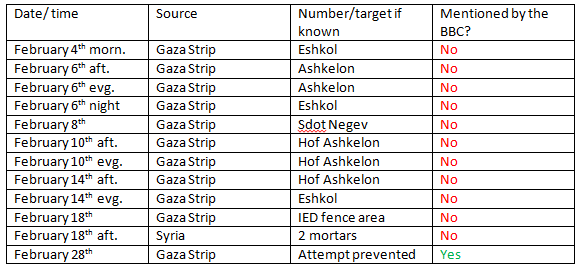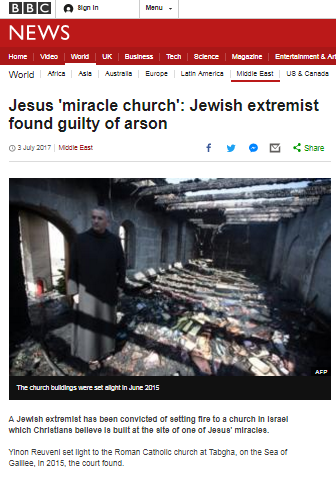As was noted in part one of this post, the November 11th afternoon and evening editions of BBC World Service radio’s flagship news and current affairs programme ‘Newshour‘ both included an interview with Lebanese academic Amal Saad who was presented only as a “political analyst and author” and who on both occasions promoted Hizballah propaganda – including in relation to Israel.
The evening edition of the programme – again presented by Rebecca Kesby – ran with the Saad Hariri resignation story as its lead item (from 00:48 here). Kesby began by telling listeners that an unidentified “many” suspect that Hariri “was coerced at the very least” into resigning from his post as prime minister of Lebanon before going on to amplify more Hizballah hyperbole.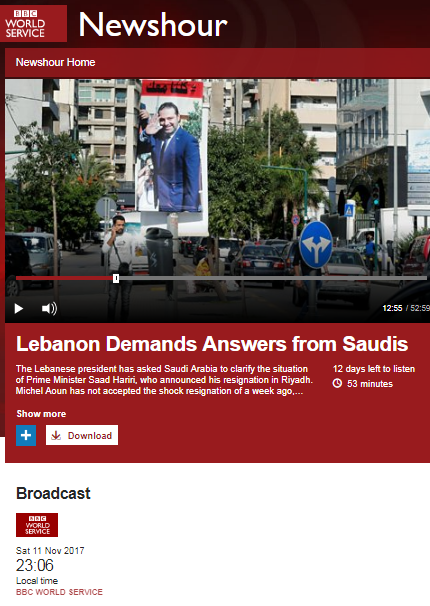
[emphasis in italics in the original, emphasis in bold added]
Kesby: “Yesterday the head of the powerful Lebanese Shia movement Hizballah, Hassan Nasrallah, said the move amounted to a declaration of war on Lebanon and the Reuters news agency quoted today an unnamed senior Lebanese official quoting the President Michel Aoun saying that he’d told foreign diplomats that he believed Mr Hariri had been kidnapped by Saudi Arabia.”
Listeners then heard from the BBC’s Arab affairs editor Sebastian Usher who reported on a statement put out by Hariri’s party before remarking that “the mystery, internationally, is growing”.
From 04:30 Kesby continued:
Kesby: “Over the past few days many nervous eyes have been watching the Middle East as Saudi Arabia ordered its nationals to leave Lebanon with immediate effect earlier this week and the US Secretary of State Rex Tillerson was warning yesterday that other countries should not use Lebanon for proxy conflict – he called it – a comment that seems to have been aimed at Riyadh potentially. So could this tense situation spill over into a new war in the region? I’ve been speaking to Professor Amal Saad who’s a Lebanese political analyst and author of ‘Hizbu’llah: Politics and Religion’.”
Listeners then heard an edited version of Kesby’s previously broadcast interview with Saad – up to and including the allegation that “Saudi Arabia is […] paying Israel money”, thereby “pressuring it to invade Lebanon” along with amplification of additional Hizballah propaganda.
Following that interview, Kesby continued to promote the theme of Israeli involvement in the Hariri story.
08:17 Kesby: “So what could the implications of Mr Hariri’s apparent resignation be for the region and what role might Israel play? I’ve been speaking to Amos Harel the defence correspondent at Ha’aretz and I asked him first was there any genuine appetite in Israel for a fresh war with Hizballah militants in Lebanon.”
After Harel responded that there is no such “appetite”, Kesby went on:
Kesby: “Even so though, there are some analysts – and even the former US ambassador to Israel Dan Shapiro – have been suggesting that Israel could actually find itself manipulated or provoked somehow into another war with Hizballah. Is that something that would concern you?”
Harel replied that such a possibility always exists, pointing out that if Hizballah’s hundreds of thousands of missiles were used to attack Israeli civilians it would not be “taken lightly”. Kesby continued:
Kesby: “I wonder what you make then of these reports circulating that Prime Minister Netanyahu has apparently sent a memo out to Israeli ambassadors to advocate in favour of Saudi Arabia in the past week or so. If those reports are true, does it make you rather nervous that this relationship could be getting a bit too cosy with the Saudis?”
Harel pointed out that the claim – reported by Israel’s Channel 10 – “doesn’t mean action” and that Saudi Arabia and Israel “see eye to eye on Iran”.
The item ended after the rest of that interview with Harel, meaning that listeners once again heard nothing at all to counter the Hizballah (and Iranian) talking points promoted by Amal Saad.
Obviously Kesby’s bland presentation of Saad as a “political analyst and author” was not conducive to aiding audiences to understand her “particular viewpoint” – as required by the BBC’s editorial guidelines on impartiality – and thus be able to put her assertions and allegations into their appropriate context.
Even a cursory look at Saad’s Twitter account gives ample insight into the views of the academic who claims to have had her contract with a US think tank “terminated because of my ‘biased’ work on Iranian foreign policy” and does not consider Hizballah to be a terrorist organisation but describes it instead as a “grassroots resistance movement”.
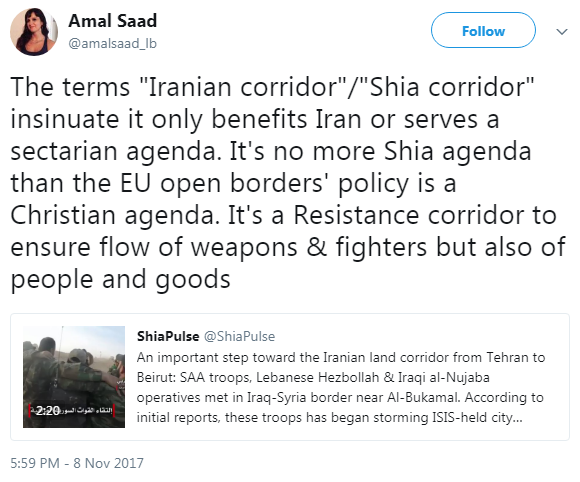
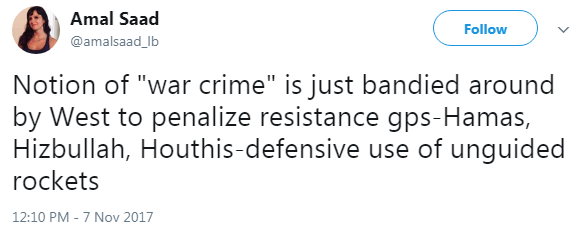
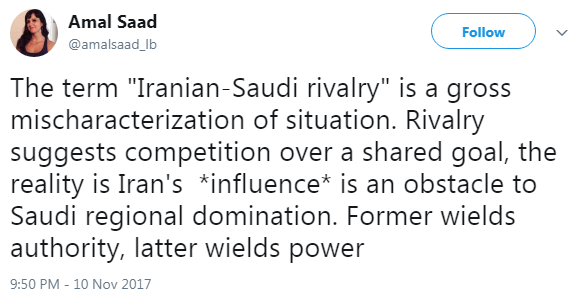
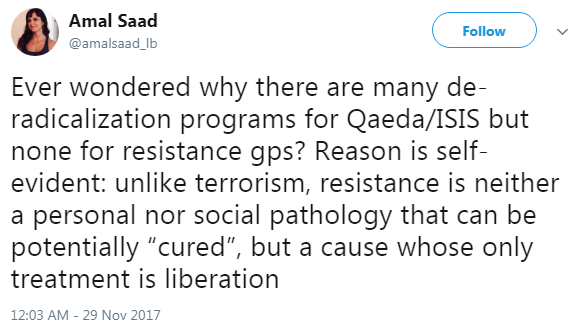
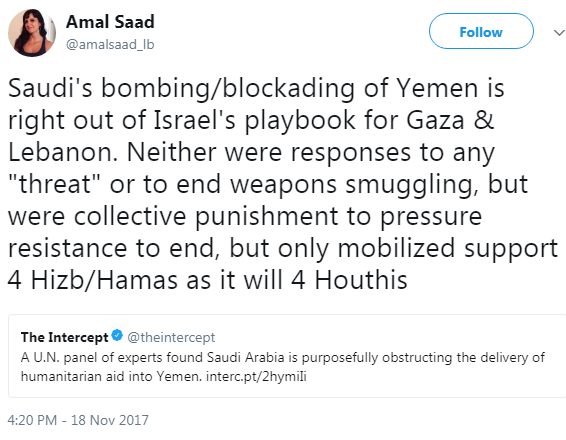
We do not of course know whether or not the ‘Newshour’ team actually bothered to research Amal Saad’s political agenda before inviting her to be the sole ‘analyst’ of the Hariri resignation story in these two episodes of ‘Newshour’. What is clear, however, is that her completely unchallenged recycling of Hizballah propaganda contributed nothing to helping BBC audiences better understand the story.
Related Articles:
BBC WS radio listeners get unchallenged Hizballah messaging – part one
Reviewing BBC portrayal of Hizballah in Hariri resignation reports

